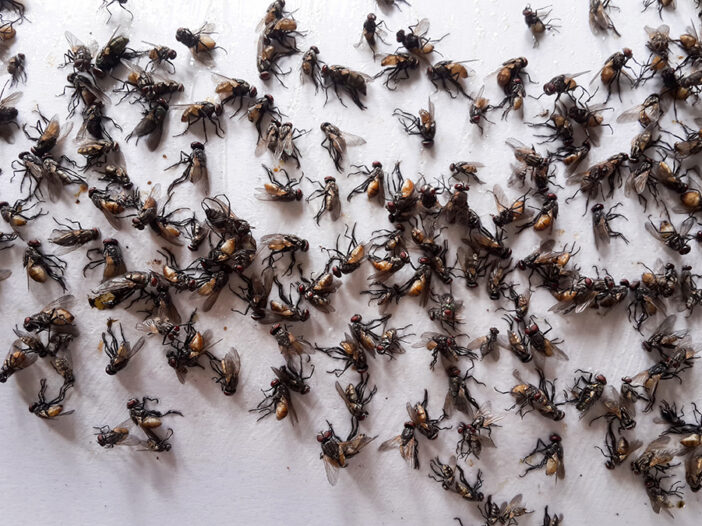
If you thought cold winter weather killed off or kept flying bugs away, think again. While spring and summer mean more creepy crawlies are around outside, the chill in the air may mean pests take up residence in your home to stay warm and dry.
One common pest known to take shelter indoors in the winter months is the cluster fly. And just as their name predicts, they like to congregate in large clusters, quickly becoming a nuisance in your home. If you suspect a cluster fly problem, contact Northwest Pest Control for an evaluation.
A cluster fly is larger than common house flies and has distinct coloring with dark gray or olive green thorax and yellow abdomen. Females lay their eggs near earthworm burrows and the larvae infest the earthworms, pupate in the soil, and then emerge as adult flies. If you’re in an area ripe with earthworms, you’re more likely to find cluster flies.
Cluster flies also tend to prefer rural or suburban areas, where fields, meadows, farms, barns, and wooded areas abound and attract earthworms. They are also partial to warm structures, particularly on south-facing walls where they can catch the warmth of the sun. This is one factor that makes them a bit less prevalent in the Pacific Northwest—the lack of winter sun.
While they are not harmful to humans and don’t cause structural damage, no one wants to live in a home buzzing with flies. First, they are annoying, but the fecal matter from the flies can leave behind stains on walls, windows, and other surfaces. And as they die off, the accumulation of corpses can leave an odor. Finally, pests attract pests, so if you have cluster flies, other pests like carpet beetles or mites may also move in to feed on the dead flies or their fecal matter.
To prevent cluster flies in your home, preventative measures are key. We’re happy to provide recommendations for action you can take to discourage cluster flies. In general, we recommend the following actions:
Seal Entry Points: Ensure that all windows, doors, and other potential entry points are properly sealed. Use weather stripping and seal any gaps or cracks in walls, windows, and doors.
Install Screens: Use fine-mesh screens on windows and doors to prevent flies from entering your home while allowing ventilation.
Maintain Cleanliness: Keep your home clean and free of food crumbs or spills. Regularly clean areas where flies might be attracted, such as kitchen counters and trash bins.
Use Fly Traps: Consider using fly traps or fly paper to capture cluster flies. These can be effective in reducing their numbers.
Apply Insecticides: Insecticides specifically designed for flies can be used in areas where cluster flies are a problem. Follow the instructions on the product carefully.
If the infestation is severe, it might be necessary to seek the services of a professional pest control company like Northwest Pest Control to address the issue. Our highly trained experts use various methods to effectively eradicate cluster flies from homes and buildings. Here are common approaches we take:
- Inspection: We will conduct a thorough inspection of the property to identify entry points, nesting areas, and the extent of the cluster fly infestation.
- Exclusion: Sealing entry points is a key step in preventing cluster flies from entering the structure. We will identify and seal gaps, cracks, and openings where flies may gain access.
- Insecticides: We may use our low-toxic, environmentally friendly, and EPA-approved insecticides specifically formulated for cluster flies. These treatments may be applied in areas where flies are active, such as attics, crawl spaces, and other potential harborage areas.
- Fly Traps: Various types of fly traps, including light traps and pheromone traps, may be used to capture cluster flies. These traps can help reduce the population of adult flies.
- Vacuuming and Removal: In cases where there are large numbers of cluster flies indoors, pest control professionals may use vacuum devices to physically remove the flies. This can be followed by proper disposal of the captured flies.
The specific methods the professionals at Northwest Pest Control use may vary depending on the severity of the infestation, and the structure of the building. We follow integrated pest management (IPM) principles, combining multiple strategies for effective and environmentally responsible control of cluster flies. If you’re facing a cluster fly problem, call us.